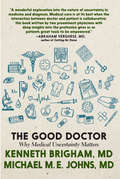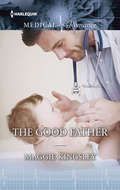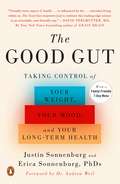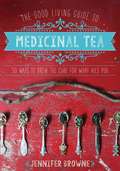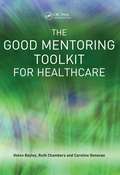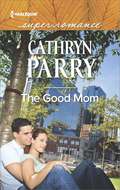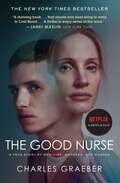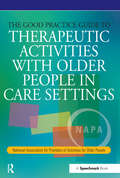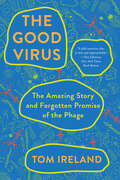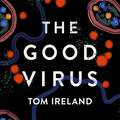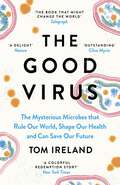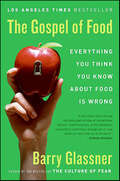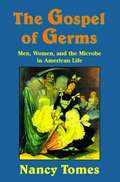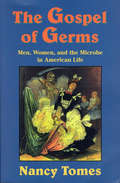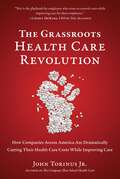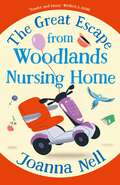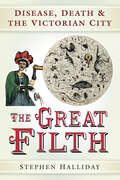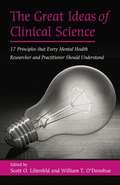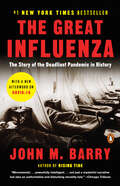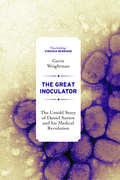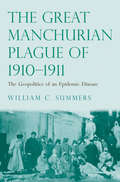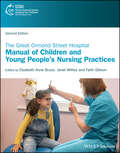- Table View
- List View
The Good Doctor: Why Medical Uncertainty Matters
by Kenneth Brigham Michael M. JohnsWhat makes a good doctor? It's not what you think. A doctor willing to face their own uncertainty in the face of illness and treatment might just be the best medicine.Too often we choose the wrong doctor for the wrong reasons. It doesn't have to be that way. In The Good Doctor, Ken Brigham, MD, and Michael M.E. Johns, MD, argue that we need to change the way we think about health care if we want to be the healthiest we can be. Counterintuitive as it may seem, uncertainty is integral to medicine, and you want a doctor who knows that: someone who sees you as the unique case you are, someone who knows that data isn't everything, someone who is able to change her mind as the information changes. For too long we've clung to the myth of the infallible doctor--one who assuredly tells us this is what's wrong and here is how I will cure you--and our health has suffered for it. Brigham and Johns propose a new model of medicine, one that is comfortable with ambiguity and that centers on an equal partnership between patient and doctor. Uncertainty, properly embraced, opens a new universe of possibilities.
The Good Doctors: The Medical Committee for Human Rights and the Struggle for Social Justice in Health Care
by John DittmerIn the summer of 1964 medical professionals, mostly white and northern, organized the Medical Committee for Human Rights (MCHR) to provide care and support for civil rights activists organizing black voters in Mississippi. They left their lives and lucrative private practices to march beside and tend the wounds of demonstrators from Freedom Summer, the March on Selma, and the Chicago Democratic Convention of 1968. Galvanized and sometimes radicalized by their firsthand view of disenfranchised communities, the MCHR soon expanded its mission to encompass a range of causes from poverty to the war in Vietnam. They later took on the whole of the United States healthcare system. MCHR doctors soon realized fighting segregation would mean not just caring for white volunteers, but also exposing and correcting shocking inequalities in segregated health care. They pioneered community health plans and brought medical care to underserved or unserved areas. Though education was the most famous battleground for integration, the appalling injustice of segregated health care levelled equally devastating consequences. Award-winning historian John Dittmer, author of the classic civil rights history Local People: The Struggle for Civil Rights in Mississippi, has written an insightful and moving account of a group of idealists who put their careers in the service of the motto “Health Care Is a Human Right.”
The Good Father
by Maggie KingsleyTaming the boss... Neonatologist Gabriel Dalgleish is passionate about his tiny patients, and highly demanding about their care. It seems as if they are the only people he really cares for. Except for Maddie. The new medical secretary slips through Gabriel's defenses, right to his vulnerable heart, making him realize everything he's missed out on in life.Yet Gabriel feels he can never be what Maddie and her young family deserve. Maddie must show him that he doesn't have to be the perfect father and husband-- just a good one. All he needs to give them is his love.
The Good Gut: Taking Control of Your Weight, Your Mood, and Your Long-term Health
by Andrew Weil Erica Sonnenburg Justin SonnenburgThe groundbreaking science behind the surprising source of good health Stanford University's Justin and Erica Sonnenburg are pioneers in the most exciting and potentially transformative field in the entire realm of human health and wellness, the study of the relationship between our bodies and the trillions of organisms representing thousands of species to which our bodies play host, the microbes that we collectively call the microbiota. The microbiota interacts with our bodies in a number of powerful ways; the Sonnenburgs argue that it determines in no small part whether we're sick or healthy, fit or obese, sunny or moody. The microbiota has always been with us, and in fact has coevolved with humans, entwining its functions with ours so deeply, the Sonnenburgs show us, humans are really composite organisms having both microbial and human parts. But now, they argue, because of changes to diet, antibiotic over-use, and over-sterilization, our gut microbiota is facing a "mass extinction event," which is causing our bodies to go haywire, and may be behind the mysterious spike in some of our most troubling modern afflictions, from food allergies to autism, cancer to depression. It doesn't have to be this way. The Good Gut offers a new plan for health that focuses on how to nourish your microbiota, including recipes and a menu plan. In this groundbreaking work, the Sonnenburgs show how we can keep our microbiota off the endangered species list and how we can strengthen the community that inhabits our gut and thereby improve our own health. The answer is unique for each of us, and it changes as you age. In this important and timely investigation, the Sonnenburgs look at safe alternatives to antibiotics; dietary and lifestyle choices to encourage microbial health; the management of the aging microbiota; and the nourishment of your own individual microbiome. Caring for our gut microbes may be the most important health choice we can make.From the Hardcover edition.
The Good Living Guide to Medicinal Tea: 50 Ways to Brew the Cure for What Ails You
by Jennifer BrowneMore than just a warm and comforting drink, tea has medicinal properties that are widely underused in North America. Common herbs, spices, fruits, and barks have been scientifically proven to help relieve pain, menopause symptoms, high blood pressure, insomnia, stress, and digestive angst. When taken preventatively, certain herbs in tea can help fight off cancer cells, heart disease, and even Alzheimer’s disease and fibromyalgia. By learning about what these various natural ingredients are capable of and how they work, readers can begin to treat many ailments with what grows in their gardens--plants that have been used in eastern medicine for thousands of years. The Good Living Guide to Medicinal Tea invites readers into a world of medicinal plants, instructs on the specific healing properties of each, matches them to ten common North American health disorders, and provides simple tea recipes readers can make in their own homes. Late Japanese author Okakura Kakuzo has been famously quoted as saying, "Tea began as a medicine and grew into a beverage. ” The Good Living Guide to Medicinal Tea encourages readers to turn their favorite drink back into medicine--and outlines exactly how to accomplish this. With the help of beautiful photographs and an easy dialogue, Jennifer Browne clearly explains to readers how teatime can garner impressive health benefits.
The Good Mentoring Toolkit for Healthcare
by Ruth Chambers Helen Bayley Caroline DonovanThis book examines how nurses will provide a first-point-of-contact consultation service as an alternative to going to see the doctor. It analyses the different nurse practitioner models around the world and presents a proposal for the UK, using research material to describe the impact of this kind of nurse practitioner on patients, doctors and other nurses. The book proposes practical steps through which this model can be implemented within Primary Care Groups, and considers the professional implications for doctors and nurses. Among the conclusions reached in the book are: * nurse practitioners are acceptable to both colleagues and patients * they will have an increasing impact on the nature of the work of doctors * the role of general practitioners may develop to complement the emerging role for nurses. The book is relevant and important reading for everyone who will be affected by these developments, including nurses, doctors, health service managers and policy makers.
The Good Mom
by Cathryn ParryIt's all for Brandon Single mom Ashley LaValley will do anything to help her twelve-year-old son, a cancer survivor, achieve his dream of becoming a doctor. Even uproot their lives and relocate to Boston when Brandon gets a scholarship to an exclusive prep school. Even accept help when Brandon risks flunking out... Even when that help comes from Dr. Aidan Lowe, an arrogant, abrasive man recently returned from a stint in Afghanistan. But the guy's also charismatic and wickedly sexy. Ashley's spent years putting her son's needs first. Now Aidan's reminding her that she has needs of her own...
The Good Nurse: A True Story of Medicine, Madness, and Murder
by Charles GraeberAfter his December 2003 arrest, registered nurse Charlie Cullen was quickly dubbed "The Angel of Death" by the media. But Cullen was no mercy killer, nor was he a simple monster. He was a favorite son, husband, beloved father, best friend, and celebrated caregiver. Implicated in the deaths of as many as 300 patients, he was also perhaps the most prolific serial killer in American history. Cullen's murderous career in the world's most trusted profession spanned sixteen years and nine hospitals across New Jersey and Pennsylvania. When, in March of 2006, Charles Cullen was marched from his final sentencing in an Allentown, Pennsylvania, courthouse into a waiting police van, it seemed certain that the chilling secrets of his life, career, and capture would disappear with him. <p><p> Now, in a riveting piece of investigative journalism nearly ten years in the making, journalist Charles Graeber presents the whole story for the first time. Based on hundreds of pages of previously unseen police records, interviews, wire-tap recordings and videotapes, as well as exclusive jailhouse conversations with Cullen himself and the confidential informant who helped bring him down, THE GOOD NURSE weaves an urgent, terrifying tale of murder, friendship, and betrayal. Graeber's portrait of Cullen depicts a surprisingly intelligent and complicated young man whose promising career was overwhelmed by his compulsion to kill, and whose shy demeanor masked a twisted interior life hidden even to his family and friends. <p><p> Were it not for the hardboiled, unrelenting work of two former Newark homicide detectives racing to put together the pieces of Cullen's professional past, and a fellow nurse willing to put everything at risk, including her job and the safety of her children, there's no telling how many more lives could have been lost. In the tradition of In Cold Blood, THE GOOD NURSE does more than chronicle Cullen's deadly career and the breathless efforts to stop him; it paints an incredibly vivid portrait of madness and offers a penetrating look inside America's medical system. Harrowing and irresistibly paced, this book will make you look at medicine, hospitals, and the people who work in them, in an entirely different way.
The Good Practice Guide to Therapeutic Activities with Older People in Care Settings (Speechmark Editions)
by Tessa PerrinThere are many activity manuals on the market today but this publication is the first to offer a clear guideline on exactly what constitutes good practice in activity provision. Written by the National Association for Providers of Activities for Older People (NAPA), a charity whose remit is to set standards and disseminate knowledge of good practice in activity provision and to support activity providers who work in care settings for older people, this guide offers: a model of good practice in one concise volume; a benchmark against which activity providers can measure and evaluate their practice; clear links to current national standards; guidance for care home owners and managers who wish to respond to the recent government initiatives on providing activities for their clients; and a call for clinical governance in the emerging 'profession' of activity provision.
The Good Virus: The Amazing Story and Forgotten Promise of the Phage
by Tom IrelandA New York Times Editors’ Choice “A deft narrative that is rich and approachable.” —Alex Johnson, New York Times Book Review How a mysterious, super-powerful—yet long-neglected—microbe rules our world and can rescue our health in the age of antibiotic resistance. At every moment, within our bodies and all around us, trillions of microscopic combatants are waging a war that shapes our health and life on Earth. Countless times per second, viruses known as phages attack and destroy bacteria while leaving all other life forms, including us, unscathed. Vastly outnumbering the viruses that do us harm, phages power ecosystems, drive evolutionary innovation, and harbor a remarkable capacity to heal life-threatening infections when conventional antibiotics fail. Yet most of us have never heard of them, thinking of viruses only as enemies to be feared. The Good Virus prompts us to reconsider, and to discover, how these viruses could save countless lives if we can learn to harness their extraordinary abilities. Taking us inside the ongoing quest to use phages’ powers for good, Tom Ireland introduces us to the brilliant, often eccentric, scientists who have fought to realize phages’ potential in the face of doubt and political intrigue. We meet the renegade French-Canadian scientist who discovered phages and pioneered their use as medicine over a century ago, leading them to be hailed as the world’s first genuine antibiotic years before penicillin. We learn why, in some pockets of the former Soviet Union, drinking a vial of phages remains as common as taking an over-the-counter drug. We follow the intrepid scientists and doctors now racing to make “phage therapy” work worldwide as the threat of antibiotic-resistant bacteria grows ever more urgent—even as other researchers uncover how phages bolster our everyday immunity, help generate the oxygen we breathe, and furnish the origins for breakthrough technologies like CRISPR. Unveiling the hidden rulers of the microbial world and celebrating the surprising power of viruses to heal, not harm, The Good Virus forever changes how we see nature’s most maligned life forms.
The Good Virus: The Untold Story of Phages: The Most Abundant Life Forms on Earth and What They Can Do For Us
by Tom IrelandThe untold story of the most abundant life form on Earth, bacteriophages, and how they play a crucial role in our lives, our health and the health of our planet.Winner of the Giles St Aubyn Award 2021Not all viruses are out to get us - in fact, the viruses that do us harm are vastly outnumbered by viruses that can actually save lives.At every moment, within your body and all around you, trillions of microscopic combatants are fighting an invisible war. Countless times per second, 'good' viruses known as phages are infecting and destroying bacteria. These phages are the most abundant life form on the planet and have an incredible power to heal rather than harm. So why have most of us never even heard of them?The Good Virus reveals how personalities, power and politics have repeatedly crashed together to hinder our understanding of these weird and wonderful life forms. We explore why Stalin's Soviet Union embraced using phages to fight disease but the rest of the world shunned the idea. We find out why scientists only recently realised phages are central to all ecosystems on Earth. And we meet the often eccentric phage heroes who have shaped the strange history of this field and are unlocking its exciting future.Faced with the terrifying threat of antibiotic-resistant superbugs, we need phages now more than ever. The Good Virus celebrates what phages could do for us and our planet if they are at last given the attention they deserve.(P) 2023 Hodder & Stoughton Limited
The Good Virus: The Untold Story of Phages: The Most Abundant Life Forms on Earth and What They Can Do For Us
by Tom Ireland'Superb ... This is luxury-class science writing'DAILY TELEGRAPH, 5* review'A delight. To learn more about phages is to discover fascinating details about a hidden world'NATURE'Outstanding'CLIVE MYRIE'This thrilling book will amaze you'MATTHEW COBB__________Not all viruses are out to get us - in fact, the viruses that do us harm are vastly outnumbered by viruses that can actually save lives.At every moment, within your body and all around you, trillions of microscopic combatants are fighting an invisible war. Countless times per second, 'good' viruses known as phages are infecting and destroying bacteria. These phages are the most abundant life form on the planet and have an incredible power to heal rather than harm. So why have most of us never even heard of them?The Good Virus reveals how personalities, power and politics have repeatedly crashed together to hinder our understanding of these weird and wonderful life forms. We explore why Stalin's Soviet Union embraced using phages to fight disease but the rest of the world shunned the idea. We find out why scientists only recently realised phages are central to all ecosystems on Earth. And we meet the often eccentric phage heroes who have shaped the strange history of this field and are unlocking its exciting future.Faced with the threat of antibiotic resistance, we need phages now more than ever. The Good Virus celebrates what phages could do for us and our planet if they are at last given the attention they deserve.__________'A new scientific frontier that couldn't be more fascinating or vital. This book is ahead of the curve and deserves to become a classic.'DANIEL M. DAVIS'Incredible and though provoking. Phages are the superheroes of the human biome.'SUE BLACK
The Gospel of Food: Why We Should Stop Worrying and Enjoy What We Eat
by Barry GlassnerFor many Americans, eating is a religion. We worship at the temples of celebrity chefs. We raise our children to believe that certain foods are good and others are bad. We believe that if we eat the right foods, we will live longer, and if we eat in the right places, we will raise our social status. Yet what we believe to be true about food is, in fact, quite contradictory.Part exposé, part social commentary, The Gospel of Food is a rallying cry to abandon the fads and fallacies in favor of calmer, more pleasurable eating. By interviewing chefs, food chemists, nutritionists, and restaurant critics about the way we eat, sociologist Barry Glassner helps us recognize the myths, half-truths, and guilt trips they promulgate, and liberates us for greater joy at the table.
The Gospel of Germs: Men, Women, and the Microbe in American Life
by Nancy TomesAIDS. Ebola. "Killer microbes. " All around us the alarms are going off, warning of the danger of new, deadly diseases. And yet, as Nancy Tomes reminds us in her absorbing book, this is really nothing new. A remarkable work of medical and cultural history, The Gospel of Germs takes us back to the first great "germ panic" in American history, which peaked in the early 1900s, to explore the origins of our modern disease consciousness. Little more than a hundred years ago, ordinary Americans had no idea that many deadly ailments were the work of microorganisms, let alone that their own behavior spread such diseases. The Gospel of Germs shows how the revolutionary findings of late nineteenth-century bacteriology made their way from the laboratory to the lavatory and kitchen, with public health reformers spreading the word and women taking up the battle on the domestic front. Drawing on a wealth of advice books, patent applications, advertisements, and oral histories, Tomes traces the new awareness of the microbe as it radiated outward from middle-class homes into the world of American business and crossed the lines of class, gender, ethnicity, and race. Just as we take some of the weapons in this germ war for granted--fixtures as familiar as the white porcelain toilet, the window screen, the refrigerator, and the vacuum cleaner--so we rarely think of the drastic measures deployed against disease in the dangerous old days before antibiotics. But, as Tomes notes, many of the hygiene rules first popularized in those days remain the foundation of infectious disease control today. Her work offers a timely look into the history of our long-standing obsession with germs, its impact on twentieth-century culture and society, and its troubling new relevance to our own lives.
The Gospel of Germs: Men, Women, and the Microbe in American Life
by Nancy TomesAIDS. Ebola. “Killer microbes.” All around us the alarms are going off, warning of the danger of new, deadly diseases. And yet, as Nancy Tomes reminds us in her absorbing book, this is really nothing new. A remarkable work of medical and cultural history, The Gospel of Germs takes us back to the first great “germ panic” in American history, which peaked in the early 1900s, to explore the origins of our modern disease consciousness. Little more than a hundred years ago, ordinary Americans had no idea that many deadly ailments were the work of microorganisms, let alone that their own behavior spread such diseases. The Gospel of Germs shows how the revolutionary findings of late nineteenth-century bacteriology made their way from the laboratory to the lavatory and kitchen, with public health reformers spreading the word and women taking up the battle on the domestic front. Drawing on a wealth of advice books, patent applications, advertisements, and oral histories, Tomes traces the new awareness of the microbe as it radiated outward from middle-class homes into the world of American business and crossed the lines of class, gender, ethnicity, and race. Just as we take some of the weapons in this germ war for granted—fixtures as familiar as the white porcelain toilet, the window screen, the refrigerator, and the vacuum cleaner—so we rarely think of the drastic measures deployed against disease in the dangerous old days before antibiotics. But, as Tomes notes, many of the hygiene rules first popularized in those days remain the foundation of infectious disease control today. Her work offers a timely look into the history of our long-standing obsession with germs, its impact on twentieth-century culture and society, and its troubling new relevance to our own lives.
The Grassroots Health Care Revolution: How Companies Across America Are Dramatically Cutting Their Health Care Costs While Improving Care
by John TorinusWhen exploding health care costs threatened Serigraph's solvency, the CEO went outside the box to find a solution. John Torinus Jr. applied innovative, cutting-edge strategies to cut his health care expenses well below the national average while improving his employees' care. Now, across America, leading companies are following Serigraph's example. There is a revolution brewing. A revolution that will dramatically lower health costs nationwide. John Torinus Jr., author of The Company That Solved Health Care, the eye-opening book detailing one company's game-changing health care program, now presents The Grassroots Health Care Revolution. Featuring examples and interviews with the business leaders who are at the forefront of these innovations, The Grassroots Health Care Revolution is a game plan for improving workforce health and radically lowering health costs. Torinus avoids the politics of health care to focus on what businesses can actually control. He shows how pioneering corporations have engaged their employees to tame the hyper-inflation that has plagued the health care industry for decades. Executives in leading companies are deploying management disciplines and marketplace principles to invent a better business model for health care. These companies are bending the curve, growing profits and improving the health of their employees. Learn how you and your business can join the revolution.
The Great Brain Debate: Nature Or Nurture?
by John E. DowlingHow much of our behavior is determined by our genes and how much by our environment? Fiercely debated but not fully resolved, we continue to grapple with this nature-vs.-nurture question. But data from the study of the developing and adult brain are providing us with new ways of thinking about this issue – ways that, finally, promise answers. Whether our personality, our intelligence, and our behavior are more likely to be shaped and affected by our environment or our genetic coding is not simply an idle question for today’s researchers. There are tremendous consequences to understanding the crucial role that each plays. How we raise and educate our children, how we treat various mental diseases or conditions, how we care for our elderly – these are just some of the issues that can be informed by a better and more complete understanding of brain development. John Dowling, eminent neuroscience researcher, looks at these and other important issues. The work that is being done by scientists on the connection between the brain and vision, as well as the ways in which our brains help us learn new languages, are particularly revealing. From this groundbreaking new research we are able to gain startling new insights into how the brain functions and how it can (or cannot) be molded and changed. By studying the brain across the spectrum of our lives, from infancy through adulthood and into old age, we see how the brain develops, transforms, and adjusts through the years. Looking specifically at early development and then at the opportunities for additional learning and development as we grow older, we learn more about the ways in which both nature and nurture play key roles over the course of a human lifetime.
The Great Escape from Woodlands Nursing Home: A gorgeously uplifting novel from the bestselling author of THE SINGLE LADIES OF JACARANDA RETIREMENT VILLAGE
by Joanna NellAt nearly ninety, retired nature writer Hattie Bloom prefers the company of birds to people, but when a fall lands her in a nursing home she struggles to cope with the loss of independence and privacy. From the confines of her 'room with a view' - of the car park! - she dreams of escape.Fellow 'inmate', the gregarious, would-be comedian Walter Clements also plans on returning home as soon as he is fit and able to take charge of his mobility scooter.When Hattie and Walter officially meet at The Night Owls, a clandestine club run by Sister Bronwyn and her dog, Queenie, they seem at odds. But when Sister Bronwyn is dismissed over her unconventional approach to aged care, they must join forces - and very slowly, an unlikely, unexpected friendship begins to grow.Full of wisdom and warmth, The Great Escape from Woodlands Nursing Home is a gorgeously poignant, hilarious story showing that it is never too late to laugh - or to love.(P) 2020 Hachette Australia
The Great Escape from Woodlands Nursing Home: A totally laugh out loud and uplifting novel of friendship, love and aging disgracefully
by Joanna Nell'I loved the characters with all their quirkiness and hilarious situations they find themselves as they face living in a nursing home... Many laugh out loud moments... Wonderful' Reader review ⭐⭐⭐⭐⭐At nearly ninety, retired nature writer Hattie Bloom prefers the company of birds to people, but when a fall lands her in a nursing home she struggles to cope with the loss of independence and privacy. From the confines of her 'room with a view' - of the car park! - she dreams of escape. Fellow 'inmate', the gregarious, would-be comedian Walter Clements also plans on returning home as soon as he is fit and able to take charge of his mobility scooter. When Hattie and Walter officially meet at The Night Owls, a clandestine club run by Sister Bronwyn and her dog, Queenie, they seem at odds. But when Sister Bronwyn is dismissed over her unconventional approach to aged care, they must join forces - and very slowly, an unlikely, unexpected friendship begins to grow. Full of wisdom and warmth, this is a gorgeously poignant, hilarious story showing that it is never too late to laugh or to love. Perfect for fans of Judy Leigh, Jill Mansell and Sally Page. Readers love The Great Escape from Woodlands Nursing Home:'Hilarious. Who doesn't love old people getting up to mischief?!' Reader review ⭐⭐⭐⭐⭐ 'A book that will leave you with a smile on your face. There are antics, laughter, and tears, but also a good read to be had. Highly recommended' Reader review ⭐⭐⭐⭐⭐'What a wonderful book this is! It's warm, empathetic, at times laugh-out-loud funny and at times it made me cry but overall it filled me with a sense of hope' Reader review ⭐⭐⭐⭐⭐'The characters in this story are just delightful and I was so absorbed with their stories that I read it in one sitting and really wished it would go on longer... Loved it' Reader review ⭐⭐⭐⭐⭐ Praise for Joanna Nell: 'Hugely entertaining . . . funny and heart-warming' Woman & Home 'Warm-hearted book that had me rooting for all the characters and laughing out loud' Libby Page, author of The Lido'Poignant and warm-hearted . . . a tonic for our times' Holly Miller, author of The Sight of You 'A warm and touching story with a cast of characters who became my friends' Katie Marsh, author of How Not to Murder Your Ex 'A funny and poignant exploration of growing old disgracefully' Culturefly
The Great Filth: Disease, Death and the Victorian City
by Stephen HallidayVictorian Britain was the world's industrial powerhouse. Its factories, mills and foundries supplied a global demand for manufactured goods. As Britain changed from an agricultural to an industrial ecomony, people swarmed into the towns and cities where the work was; by the end of Queen Victoria's reign, almost 80 per cent of the population was urban. Overcrowding and filthy living conditions, though, were a recipe for disaster, and diseases such as cholera, typhoid, scarlet fever, smallpox and puerperal (childbed) fever were a part of everyday life for (usually poor) town-and city-dwellers. However, thanks to a dedicated band of doctors, nurses, midwives, scientists, engineers and social reformers, by the time the Victorian era became the Edwardian, they were almost eradicated, and no longer a constant source of fear. Stephen Halliday tells the fascinating story of how these individuals fought opposition from politicians, taxpayers and often their own colleagues to overcome these diseases and make the country a safer place for everyone to live.
The Great Ideas of Clinical Science: 17 Principles that Every Mental Health Professional Should Understand
by Scott O. Lilienfeld William T. O'Donohue<p>The idea that there is a fundamental rift between researchers and practitioners should not come as a surprise to anyone familiar with the current literature, trends, and general feelings in the field of clinical psychology. Central to this scientist-practitioner gap is an underlying disagreement over the nature of knowledge - namely that while some individuals point to research studies as the foundation of truth, others argue that clinical experience offers a more adequate understanding of the causes, assessment, and treatment of mental illness. <p>The Great Ideas of Clinical Science is an ambitious attempt to dig beneath these fundamental differences, and reintroduce the reader to unifying principles often overlooked by students and professionals alike. The editors have identified 17 such universals, and have pulled together a group of the most prolific minds in the field to present the philosophical, methodological, and conceptual ideas that define the state of the field. Each chapter focuses on practical as well as conceptual points, offering valuable insight to practicing clinicians, researchers, and teachers of any level of experience. Written for student, practitioner, researcher, and educated layperson, this integrative volume aims to facilitate communication among all mental health professionals and to narrow the scientist-practitioner gap.</p>
The Great Influenza: The Story of the Deadliest Pandemic in History
by John BarryAt the height of WWI, history's most lethal influenza virus erupted in an army camp in Kansas, moved east with American troops, then exploded, killing as many as 100 million people worldwide. <P><P>It killed more people in twenty-four months than AIDS killed in twenty-four years, more in a year than the Black Death killed in a century. But this was not the Middle Ages, and 1918 marked the first collision of science and epidemic disease. <P><P>Magisterial in its breadth of perspective and depth of research and now revised to reflect the growing danger of the avian flu, The Great Influenza is ultimately a tale of triumph amid tragedy, which provides us with a precise and sobering model as we confront the epidemics looming on our own horizon. <P><P>John M. Barry has written a new afterword for this edition that brings us up to speed on the terrible threat of the avian flu and suggest ways in which we might head off another flu pandemic. <P><P><b>A New York Times Bestseller</b>
The Great Inoculator: The Untold Story of Daniel Sutton and his Medical Revolution
by Gavin WeightmanSmallpox was the scourge of the eighteenth century: it showed no mercy, almost wiping out whole societies. Young and old, poor and royalty were equally at risk – unless they had survived a previous attack. Daniel Sutton, a young surgeon from Suffolk, used this knowledge to pioneer a simple and effective inoculation method to counter the disease. His technique paved the way for Edward Jenner&’s discovery of vaccination – but, while Jenner is revered, Sutton has been vilified for not widely revealing his methods until later in life. Gavin Weightman reclaims Sutton&’s importance, showing how the clinician&’s practical and observational discoveries advanced understanding of the nature of disease. Weightman explores Sutton&’s personal and professional development, and the wider world of eighteenth-century health in which he practised inoculation. Sutton&’s brilliant and exacting mind had a significant impact on medicine – the effects of which can still be seen today.
The Great Manchurian Plague of 1910-1911
by William C. SummersWhen plague broke out in Manchuria in 1910 as a result of transmission from marmots to humans, it struck a region struggling with the introduction of Western medicine, as well as with the interactions of three different national powers: Chinese, Japanese, and Russian. In this fascinating case history, William Summers relates how this plague killed as many as 60,000 people in less than a year, and uses the analysis to examine the actions and interactions of the multinational doctors, politicians, and ordinary residents who responded to it. Summers covers the complex political and economic background of early twentieth-century Manchuria and then moves on to the plague itself, addressing the various contested stories of the plague's origins, development, and ecological ties. Ultimately, Summers shows how, because of Manchuria's importance to the world powers of its day, the plague brought together resources, knowledge, and people in ways that enacted in miniature the triumphs and challenges of transnational medical projects such as the World Health Organization.
The Great Ormond Street Hospital Manual of Children and Young People's Nursing Practices
by Faith Gibson Elizabeth Anne Bruce Janet WillissThe Great Ormond Street Hospital Manual of Children and Young People’s Nursing Practices Clinical skills are essential in the provision of care for children and young people. The Great Ormond Street Hospital Manual of Children and Young People’s Nursing Practices provides expert guidance on evidence-based clinical procedures, helping students and newly registered nurses develop sound clinical judgement and confidence. This comprehensive resource covers all aspects of children’s nursing, from the fundamentals of everyday practice to advanced care in high dependency and intensive care settings. As such, its relevance and usefulness reach beyond those newly registered; it remains a valuable resource for experienced nurses wishing to further expand their nursing skills. Now in its second edition, this thoroughly updated guide demonstrates each procedure, explains the underlying theory and evidence, and speaks to the unique challenges of working with children and young people. New chapters address mental health, complementary therapies, learning difficulties, and the deteriorating child, whilst expanded content examines blood glucose monitoring, glucocorticoid treatment, insulin administration, diabetes care, surgical diathermy, non-invasive ventilation, and much more. Key Features Provides evidence-based guidelines for more than 300 clinical procedures Features an abundance of colour photographs and illustrations Examines the needs of neonates and adolescents in the context of interdisciplinary care Includes new material on health research and evidence-based practice, stages of development, children with complex needs, and admission, transfer, and discharge Complements The Royal Marsden Manual of Clinical Nursing Procedures, offering continuity to those working in both adult and paediatric settings The second edition of The Great Ormond Street Hospital Manual is an indispensable resource for registered nurses, students, and other healthcare professionals involved in delivering clinically effective, evidenced- based, family-centred care. Praise for the previous edition “This manual builds on the knowledge, skills and expertise of one of the UK’s finest children’s hospital and explains comprehensive, evidence-based care clearly.” Nursing Children and Young People Journal “All children’s nurses should have this book as a reference.” Nursing Standard “… a comprehensive resource for all qualified nurses, students and other healthcare professionals involved in caring for children in hospital and community settings.” Times Higher Education Supplement
